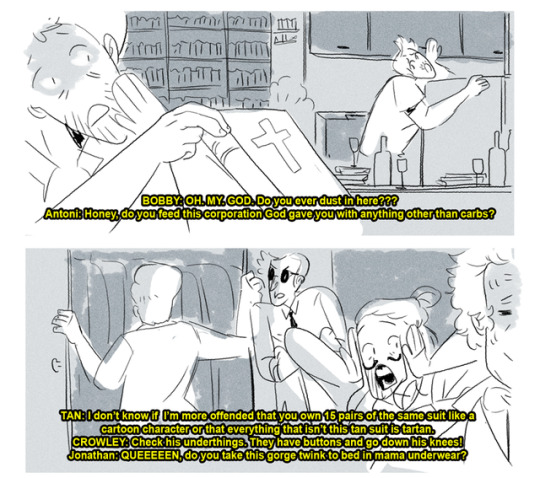Don't wanna be here? Send us removal request.
Text
How odd. I was a female through the dating years, and guys didn’t initiate relationships with me. I had to actively pursue romantic prospects in order to get any tail.
I think it’s actually that *nobody* asks others out and *anybody* who wants a relationship must pursue.
its so weird to me how hostile the ratsphere is to leftism, because like…yeah, the times its been tried havent been great, but also the times its been tried have almost always been when in severe extenuating circumstances (the USSR was like, pre-industrial, china had just fought a massive war that wrecked it, north korea was the site of a massive proxy war, and then lost its international support, etc etc) like. this seems like insufficient evidence for the proposition that “actually, the system where people freeze to death in the streets is the only good one”
277 notes
·
View notes
Text
Your ideology – if it gets off the ground at all – will start off with a core base of natural true believers. These are the people for whom the ideology is made. Unless it’s totally artificial, they are the people by whom the ideology is made. It serves their psychological needs; it’s compatible with their temperaments; it plays to their interests and preferences. They’re easy to recruit, because you’re offering something that’s pretty much tailor-made for them.
Keep reading
318 notes
·
View notes
Text
When ants die, a few days later they emit oleic acid, which tells the living ants to dispose of their corpse.
A myrmecologist named Ed Wilson discovered this and dropped the chemical on a living ant. It was immediately carried off, despite the fact that it was still moving, and clearly not dead.
254K notes
·
View notes
Text
im gonna plant this zucchini and I will NOT regret it
3 notes
·
View notes
Note
zucchini is good heathens(yes even the 3-foot-long monstrosities)
Winter vegetables? Please elaborate?
Vegetables you plant in mid-summer and harvest in early fall! also called “Late Season”, “Fall” or “Cool Weather” vegetables. In mediterranian climates, you plant them on like, Halloweenish and harvest them in the middle of ‘winter’/February, and since I grew up in CA, I still call them ‘winter vegetables’.
Winter vegetables include: Pumkins (tho they’re slow-growing so it’s better to put them in a bit early), other Fall/hard Squash, broccoli, Brussel Sprouts, cauliflower (really, the whol wild mustard family), Carrots and in general, the tougher, non-leafy vegetables.
In CO, there’s really 4 growing seasons, which are:
“Start indoors and play frost chicken until early summer (March-early june)”: Plant Lettuce and other leafy greens that will grow under a light, herbs from seed, tomatoes from seed, other things that normally harvest mid-summer
“Early Summer (Early May-early July): Tomato starts, peas, Potatoes,Corn, Herb starts, summer squash, zucchini (don’t), melons, Millet, Summer Wheat, Spelt, and other things sold in inviting little containers around mother’s day
“Late Summer to Fall Frost Chicken”: Fall squash, broccoli, brussel sprouts, Kale for some reason, potatoes if you want the bitty ones in fall, stuff from the greenhouse discount rack, Carrots, Winter wheat, Rye
“This Is Actually A Perenial (Next year)” : Some things you put in the dirt and harvest Next Year: Garlic, Big Onions, Potatoes that you didn’t dig up last summer, fruit trees etc
“ABSOLUTE HUBRIS” Keeping Tropical Plants in pots and playing year-round weather-chicken/taking them indoors and yelling at the cat to stop eating them all Winter: Lemon Shrub, Vanilla Orchid.
IDK how Lemon Shrub is still alive, we’ll see if I can keep the Orchid alive this winter by putting it in a cat-resistant cage in the bedroom.
438 notes
·
View notes
Text
I’ve been reading this thread on why costs of housing, education, healthcare etc have increased https://www.econlib.org/why-the-prices-are-so-damn-high-a-deeper-look/
It seems like noting the Barmol effect here is kind of restating the problem. Even if it is true that most of the cost rise is an artifact of education etc not being automated as quickly as the typical sector of the economy, it’s not really an explanation of what is really the root cause.
It is more interesting to ask WHY these sectors are unusually resistant to automation, or swapping highly trained workers, for a mix of automation and less training.
It does not really seem apriori true that these sectors should be wildly impossible to automate. One would guess that e-learning, particularly at the high school and college level where education is not in large part a childcare service, would have widespread impacts. Similar with housing or healthcare.
My guess is that regulatory capture is probably a large part of the explanation for why these particular fields are automation-resistant.
A lot of the authors in the above-linked discussion seem to be assuming a model of regulatory capture where the primary method used to benefit incumbent workers is supply restriction. Ie. Lobbyists push to have very restrictive regulations on who can enter the field enacted. This causes prices to rise. But there does not seem to be extremely disproportionate increases in wages in many of these fields. Which would seem to suggest that this is not occurring.
But it seems to me that regulatory capture can just as often work through boosting demand artificially, not merely constricting supply. It can work by increasing the job security of those in the regulated field, or by increasing the number of people in the field that are required to do common tasks through artificial inefficiency. Policy can serve to restrict the introduction of potential new modes of automation. Policy can create artificial inefficiency by mandating in that useless tasks be done along with the productive work.
And if in the long run workers in the restricted fields are highly fungible with workers in other fields (ie. doctors, teachers, construction workers and so on could easily have chosen a different profession over the course of their career or vice versa), than it seems like this should not cause extreme salary rise in the affected fields.
And that in-fact there are many cases where lobbyists would find it more in the interests of those who they represent to behave in this way.
It might be that the main ways of restricting labor supply will also put those currently in the field at risk of exclusion also
Job security, not income might be the main priority.
It might be easier to conceal demand boosting regulations as beneficial
There may be overlapping interests between companies and workers in the demand boosting case but not the supply restricting case.
It might be true that people resist automation not to get more, but keep what they have relative to society as a whole.
32 notes
·
View notes
Text
nuclear families are a powerfully effective way to hide abuse
Here’s something I want to discourse about: which is better, extended families or nuclear families?
I am inclined to say nuclear families because, from what I’ve heard from my parents, extended families in the Old Country were p awful.
(Some opponents of nuclear families exaggerate the extent to which they are an effect of capitalism. Really, they are pretty ancient, an effect of the Catholic Church’s efforts to break the power of Germanic clans in the Early Middle Ages. But that is not really relevant.)
2 notes
·
View notes
Text
one time while we were in the car andrew said “i basically think your gender is whatever robot body you would choose to have in a transhumanist future, but then again, that would make my gender a featureless floating orb” and i think about that a lot
66K notes
·
View notes
Photo



So Crowley nominated Aziraphale to Queer Eye.
22K notes
·
View notes
Text
Can we talk about what happens when they see a creek? If they are compelled to cross it, they will do so, and then be on the other side, still next to running water.
Any Eripmav who comes close to running water will be stuck there for eternity, hopping over and over again.
Concept: a daywalking vampire who has the exact opposite of all the traditional vampire weaknesses – freezes to death in the dark, compelled to cross running water, can only eat food with garlic in it, and can’t count.
3K notes
·
View notes
Text
The idea that Pokémon is a contraction of the English “Pocket Monsters” is blatantly untrue when put under any kind of scrutiny; the poke element is a Japanese rendering of Pokkim (”Undermountain”), a term originating from the Ainu dialect of Sinnoh, who believed that the creatures spawned from the depths of Tengansan (Mt. Coronet). It is due to this primordial connection that the Ainu held rock and ground pokémon in particularly high esteem, specifically Rhyhorn, who they honored as the “first” pokemon. It is only with the later settlement by the Yamato people that we see the cultural ascendance of “heavenly” pokemon - Dragon, Flying, Fire, Electric, and Water.
In the Kofun period, as the early Japanese courts adopted Chinese culture, plant-type pokemon rose to social prominence, as Chinese philosophers glorified plant-type pokémon for their value in cultivating land, sustaining civilization, and promoting social harmony with their aesthetics (and, as would be later understood, chemical manipulation of the human brain). For this reason, the bulbasaur, a ubiquitous pokemon in China, was adopted as the chief pokemon of the Japanese imperial courts, despite the creature being alien to Japan. Later Japanese emperors would enshrine the mountain-carving Korean Blastoise and, much later, the European Charizard as equal symbols of Japanese cultural reach, but Bulbasaur always held the position as the primal pokemon of Kanto.
This “plantmania” did have a literally toxic knock-on effect, as the Kanto population of plant-type pokémon are entirely poisonous, unlike those found in other regions (including the imported Sinnohan Tangela; note that Tangela only dwells in a patch of grass near the aging port of Pallet Town, and in the Safari Zone). This led to a disproportionate amount of power concentrating in the hands of the psychic-training mediums in Kanto society, including the notorious “shadow regime” of the Itako of Mt. Osore.
Due to the psychic stranglehold on Kantese politics, the people were unusually ignorant of Ghost-types (with their existence only confirmed with the Sylph Co.’s work at the end of the 20th century), and Dark-types had been completely exterminated from the region despite their presence in neighboring Johto (with the dark variants of Kantese pokémon establishing roots in Pacific Island chains such as Alola).
Oda Nobunaga introduced Steel and Dark-type pokémon into the region in his attempt to unify Honshu and wrestle power from regional psychic priesthoods; While these types remained in Johto, their population never stabilized in Kanto and faded quickly after Nobunaga’s death in Honnō-ji at the hands of Akechi Mitsuhide‘s Portuguese Charizard Kapadokya.
At the end of the Kofun period, the Emperor established a rule to curb similar excesses; the peasantry could only own normal and bug Pokemon, while those of the merchant class could use water and flying, and no more than three. The other types, especially the “heavenly,” were the domain of the nobility; a noble could train up to six pokemon, but they must be of the type of their house. The Dragon-class was the sole domain of the Emperor and his household, who alone could raise pokémon of any type, without restriction. The Dragon-class privilege was later extended to the shogun in the Tokugawa period, leading to the eradication of the Fairy-type from Japan, with most local varieties of those species bred into normal-types.
This legally enforced connection of the poke to the symbolism of the noble and imperial houses lead to their conceptual merger with the Japanese system of heraldry, the mon.
In the Kamakura period, Johto became a major cultural and commercial center, as its rich soil allowed the production of Apricorns, which could be ritually altered with carving and mercury inlaying to seal away pokemon in a small, weightless space. These sealing spheres allowed the development of a far more efficient and mobile pokémon warrior class, leading to the ascension of the pokésamurai and a strong ronin underbelly, with Minamoto no Yoritomo generally acknowledged as the first pokemon master.
In the Meiji period, these noble houses’ type-monopolies were disposed of, and pokémon training was reorganized into the Gymnasium system of continental European origin.
6K notes
·
View notes
Text
let’s put this asshole in jail

Joey the player is finally going to get what’s coming to him. Pass it on!
34 notes
·
View notes
Text





Anyone can play a princess. Anyone who says otherwise has a small imagination.
Photographer: Lily Andrui
Models: Vidal Francisco and Danae Kristine
125K notes
·
View notes
Note
Nobody hates you for being weird, or needing accommodations. But every accommodation you get comes at the cost of someone who's going to be fired if they don't show up for work on the dot, or call in sick, or act just the slightest bit weird. They're out there putting in 12 hour shifts so that you can make widgets that put the out of work, or price them out of the city they've lived in their whole lives.
So I think this is an unusually candid explanation of why people hate people who work in tech, and I appreciate that. It’s also not true, though.
Accommodations for some disabled workers do not come at the expense of workers in different industries. There’s no real way that could be the case - Google’s budget for nap rooms and food served in the office comes, like the rest of Google’s budget, from selling ads, and is part of Google’s employee compensation, and also for many disabilities is required by law. People who get accommodations at work are not stealing them from you.I didn’t make widgets; I worked at a company that does background-blind hiring. You take their coding test, and if you can demonstrate coding skills you get a referral to tech companies with open roles that are a fit for your skills. We got jobs for people who were, yes, putting in 12 hour shifts as a delivery driver or warehouse worker. It was pretty great.
Here’s the kind of thing that the tech workers I know actually do: automate biological sciences so we can develop new medicines more cheaply and more efficiently; develop better payment processors for small businesses; make it easier to order skincare products; show people news articles; teach people to code; work on mitigating AI risks; make websites for nonprofits; make websites for for-profits. Some of these are incredibly noble endeavors, some of them are just small, reasonable things that people do because they make a particular kind of need easier to fill or product easier to access. None of them are automation of blue-collar work, because automation of blue-collar work just largely isn’t commercially viable or a good idea right now. I know far more people working on automating aspects of law, recruiting or accounting than people working on automating waitressing or security or cashiering.
You know who’s to blame for long shifts and shitty workplace conditions? Society, which is finally rich enough to make things better but mostly hasn’t. You know who is not to blame? Disabled workers whose jobs don’t suck.
And do you know who’s to blame for the catastrophic rise in housing costs? City governments that have eagerly brought in jobs without building more homes, thrown in restrictive laws preventing people from building homes on the land they have, and parking and land-use requirements that make cheap housing for everyone unviable and nonexistent. They’re fucking over all of us and you should absolutely be angry about it.
So here’s what I think happens. I think that people hate tech people, and have tough lives, and I think that they decide that this is because the tech people are stealing our workplace disability accommodations at your expense somehow, or that our jobs are destroying your jobs, or that immigrants to a city have no right to live there and cities are only for natives.
But that’s not what’s going on. That’s not what tech is, and that’s not how jobs work. And if we aren’t focused on the actual problems – and disabled people at tech companies getting accommodations is not, I cannot say this emphatically enough, the problem – then we can’t solve them. Ripping away every nice thing about tech would not improve anything about your life one bit. Universal healthcare, a massive expansion of the earned income tax credit, and housing reform would. Pick your enemies with that in mind.
226 notes
·
View notes
Photo
chicken thigh, colorized (2019)

I submit one (1) hamb leg for your consideration
57K notes
·
View notes
Text
I had the same reaction! Specifically the phrase “If you’re too disabled to [walk] those distances you’re probably too disabled to cycle”
Cycling is the only non-painful form of transit available to me. Disability is not a continuum from abled to broken. I am, in fact, unable to walk, and cycling is a useful accommodation.
I suggest OP to redirect their anger from cyclists to the apparently inadequate local transportation council. If the bikes had sufficient lanes to accommodate the volume of cyclists, they wouldn't be in the way of pedestrians.
If that council weren’t so busy spending their budget accommodating cars, they might consider the needs of other transit users.
I was walking home from the shops for the first time since moving here. Calm residential area so my main worry while walking around in the dark was not brushing past overhanging shrubs and trees from people’s yards. A car coming the other way had headlights on full beam and I walked right into an overhanging branch - fortunately it was a leafy one with nothing hard enough to hit my head on. And then I realised there are no fucking cyclists. They’re a plague at uni, some of them probably obey traffic laws and common fucking courtesy but enough of them think they own every surface they can possibly physically ride on… I walk faster than most people when alone, hence I can zone out listening to music while looking ahead of me without anyone unexpectedly getting in my way, unless they’re a runner in which case they always make an effort to give others a wide berth. But cyclists? They see a gap, they’ll come up from behind you, swerve, go in front of you, and somehow block your path while going in the same direction. They’ll barrel down narrow footpaths and force you to give way, meaning you step into dank (winter) or snake infested (summer, and I’m talking Australian snakes, no cute lil garter snakes) crap. I resting bitch face anyone I think is taking more than their fair share of the path. This works great on pedestrians, but cyclists? They may or may not look like they’re aware you exist. Bumping into a big dude isn’t a fun prospect but he’s probably not going to get violent, especially with witnesses, so I don’t expect physical harm. Cyclist? Yeah I’d rather not test that. So there’s a whole class of selfish worthless pieces of shit who will not move for anything smaller or slower than them, and nowhere you can access by bike is safe from them. Oh, I’ve given the finger to a few cars that seem to be unaware pedestrian crossings exist, but there are clearly defined points on the route where you may have to deal with cars and you can wait to see if they’re slowing down enough or not. It requires sporadic vigilance, not constant vigilance. I wonder if European cultures (the specific ones with lots of cyclists) are just better and so don’t have this problem. But cyclists in Australia? The only reason I don’t want a good chunk of them to get hit by a bus is that I don’t want to put the poor bus driver through that. (Like, not damaged enough to clog up the road or healthcare system or be a distasteful sight, just tap them hard enough for them to come off their bike and give them a good scare.) So yeah, I fucking hate cyclists. You want to get some exercise in or you don’t want to walk for an hour if the shitty busses aren’t running? No worries. But there is no good reason to ride your bike around campus beyond dick-compensating, fucking walk bitch. I would fucking love to ban bikes from campus and maybe a kilometre around it. If you’re too disabled to handle those distances you’re probably too disabled to cycle and if not then I, hypothetical Transport Czar, would issue exemptions to anyone who would also qualify for a disabled parking permit. Maybe my old campus is just uniquely shitty, and other student cultures are better. Right now? Mmmm, cars and pedestrians only. (And prams and mobility scooters and whatnot, but you tend to notice when those are coming at you.)
7 notes
·
View notes